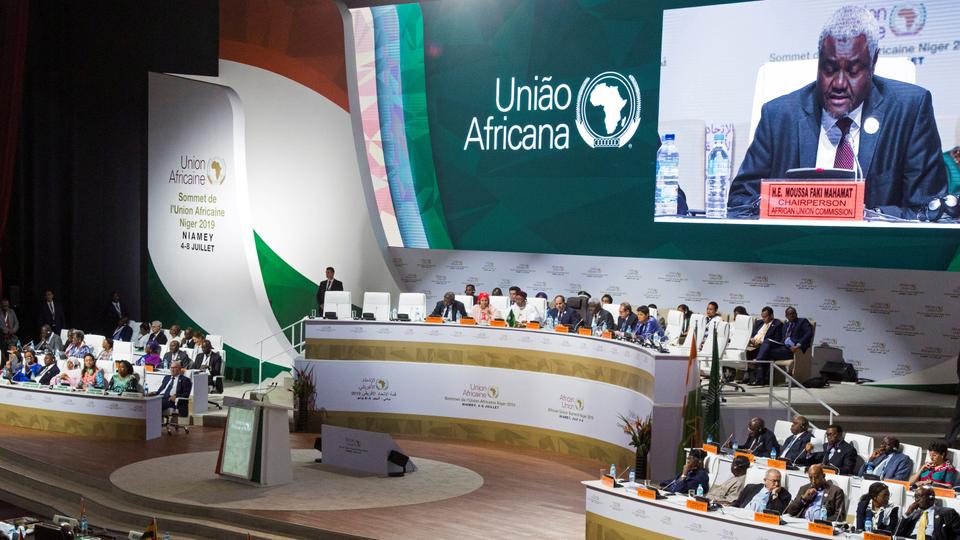The African Union Commission has slated its Specialised Technical Committees (STC) meeting on Finance, Monetary Affairs, Economic Planning and Integration for this coming December 1-3 to discuss the planned launch of the African Continental Free Trade Area (AfCFTA).
Following the growing global concerns on the spread of the COVID-19 pandemic, jointly, the Commission and the Republic of Ghana, agreed to postpone, until further notice, the 4th STC on Finance, Monetary Affairs, Economic Planning and Integration, scheduled to be held from March 9-14, 2020, in Accra, Ghana.
The Ministerial STC and its related high-level side events will be coming up this December.
The African Union Commission Specialised Technical Committees (STC) on Finance, Monetary Affairs, Economic Planning and Integration is the leading Conference for African ministers responsible for finance, economy, planning, integration and economic development, and central bank governors, to discuss matters about the development of Africa.
This STC is also charged with following up on implementation of the integration agenda for the continent.
The AU Commission is organising its 4th STC on Finance, Monetary Affairs, Economic Planning and Integration under the theme Leveraging the 4th Industrial Revolution to address Youth Unemployment in Africa.
The theme is relevant in driving the realisation of Africa’s Agenda 2063, particularly, “Aspiration 1” which seeks a prosperous Africa based on inclusive growth and sustainable development.
The 4th Industrial Revolution (4IR) is bringing the hope of a new era for Africa’s transformation and prosperity, as it is changing the way we live, think and work, through rapid advancements in digital technology, new materials, especially when it comes to advanced robotics, artificial intelligence and machine learning.
It focuses on the transition to new systems, built on the infrastructure of the digital evolution and has the potential of fast-tracking the integration of the continent into the global value chain, through industrial development.
The 4IR will enable companies and organizations to benefit from the efficiencies at the work place. It is estimated that, faster adoption of digital technology will enable companies and organizations to work smarter and faster, resulting in the creation of value gains for customers and users.
More specifically, African policymakers need to ensure that the 4IR, take advantage of the opportunities associated with a young population, and the expected demographic dividend. Therefore, tying these opportunities together in a region that is urbanising faster than any other, should be a strategic imperative.
It is estimated that by 2050 Africa will have 830 million youths. Therefore, successfully harnessing their potential will support broad-based innovations increased productivity, and lead to inclusive and sustainable economic growth across the region.
The 2020 STC aims at exploring the impact of the 4IR on Africa and African youth participation in the future of job market, given the changing dynamics.
It will deliberate on how African leaders and policy-makers can harness the impact of the 4IR to create a future-driven inclusive society aiming at reducing unemployment amongst African youths.
This will include assessing the continent’s readiness to absorb the shocks of the ‘4th Wave,’ in order to harness the opportunities of the digital era. It will also identify the drivers of change and their likely consequences over the next half century, and propose policy choices that will enable Africa to fulfil its potential in the years ahead.
The STC will also add to the scant knowledge base on this topic for Africa and reflect the latest evidence from leading reports such as the Africa’s Development Dynamics, whose 2020 edition would focus on policy responses needed for a better “Future of Work” in Africa given the process of technological change, demographic, urban and green transition.
AfCFTA is, however, a free trade area which, as of 2018, includes 28 countries. It was created by the African Continental Free Trade Agreement among 54 of the 55 African Union nations.
The free-trade area is the largest in the world in terms of the number of participating countries since the formation of the World Trade Organisation.
Accra, Ghana serves as the Secretariat of AfCFTA and was commissioned and handed over to the AU by the President of Ghana, Nana Addo Dankwa Akuffo Addo, on August 18, 2020 in Accra.
The agreement was brokered by the AU and was signed on by 44 of its 55 member states in Kigali, Rwanda on March 21, 2018. The agreement initially requires members to remove tariffs from 90% of goods, allowing free access to commodities, goods, and services across the continent.
The United Nations Economic Commission for Africa estimates that the agreement will boost intra-African trade by 52 percent by 2022.
The proposal was set to come into force 30 days after ratification by 22 of the signatory states.
On April 2, 2019, The Gambia became the 22nd state to ratify the agreement,[18] and on April 29 the Saharawi Republic made the 22nd deposit of instruments of ratification; the agreement went into force on May 30 and entered its operational phase following a summit on July 7, 2019.[19]
The general objectives of the agreement are to: Create a single market, deepening the economic integration of the continent; establish a liberalised market through multiple rounds of negotiations; aid the movement of capital and people; facilitating investment; move towards the establishment of a future continental customs union; and achieve sustainable and inclusive socio-economic development..
Others include, gender equality and structural transformations within member states; enhance competitiveness of member states within Africa and in the global market; encourage industrial development through diversification and regional value chain development, agricultural development and food security; and resolve challenges of multiple and overlapping memberships
The AU Commission says the Specialised Committee on Finance, Monetary Affairs, Economic Planning and Integration will convene to discuss a payment system for the AfCFTA.
The Development of a Continental Payment System to facilitate effective implementation of the AfCFTA will feature during the meeting, the AUC said.
The meeting, to be convened under the theme, “Securing Africa’s Taxing Rights, Stemming Illicit Financial Flows and developing payment system for AfCFTA”, will play a relevant role in driving the realisation of Africa’s Agenda 2063, the AUC said.
In particular, the meeting will play a major role in helping to achieve “Aspiration 1,” which seeks a prosperous Africa-based on inclusive growth and sustainable development.
The meeting will address the global tax debate regarding the tax challenges arising from the digital economy and how this affects Africa.
Stemming Illicit Financial Flows (IFFs) on the continent will also feature during the meeting.







